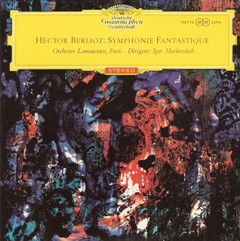111 Years of Deutsche Grammophon - CD 34
111 Years of Deutsche Grammophon - CD 34
Berlioz: Symphonie fantastique / Cherubini: Overture "Anacréon" / Auber: Overture "La Muette de Portici"

Symphonie fantastique, Op.14 1 1. Rêveries. Passions (Largo - Allegro agitato ed appassionato assai) [14:15] 2 2. Un bal (Valse: Allegro non troppo) [6:08] 3 3. Scène aux champs (Adagio) [15:58] 4 4. Marche au supplice (Allegretto non troppo)[4:48] 5 5. Songe d'une nuit du Sabbat (Larghetto - Allegro - Ronde du Sabbat: Poco meno mosso) [11:03] Luigi Cherubini (1760 - 1842) 6 "Anacreon" Overture [9:44] Daniel François Esprit Auber (1782 - 1871) La Muette de Portici 7 Overture [8:18] Orchestre des Concerts Lamoureux Igor Markevitch – conductor
Symphonie fantastique: Épisode de la vie d'un Artiste...en cinq parties (Fantastic Symphony: An Episode in the Life of an Artist, in Five Parts), Op. 14, is a program symphony written by the French composer Hector Berlioz in 1830. It is an important representative piece of the early Romantic period, and is still very popular with concert audiences worldwide. The first performance took place at the Paris Conservatoire in December 1830. The work was repeatedly revised between 1831 and 1845 and subsequently became a favourite in Paris.
The opera Anacréo by Cherubini, involving the eponymous Greek poet in a fanciful love affair, received its premiere at the Paris Opéra on October 4, 1803, running for only four performances. The dashing overture, however, was praised by Weber and even Berlioz (because of its presentiments of Beethoven’s Leonore Overture No. 3, and perhaps even the “Eroica”?) and taken up during the last century by Toscanini as a frequent program opener. It has never completely disappeared from the concert hall, and recordings of it are not uncommon.
La muette de Portici (The Dumb Girl of Portici, or The Mute Girl of Portici) originally called Masaniello, ou La muette de Portici, is an opera in five acts by Daniel Auber, with a libretto by Germain Delavigne, revised by Eugène Scribe. The work has an important place in musical history, as it is generally regarded as the earliest French grand opera.








